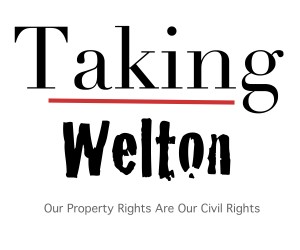Eminent Domain’s Great Farmland Heist
“When TransCanada first approached Crawford’s father in 2008, and offered to pay about $7,000 for easement rights, he refused, telling the company, “We don’t want you here.” He said the corporation could reroute the line, just as other pipeline companies in oil-rich Texas had done for decades. TransCanada increased the offer in the following years, but the family still refused. In August 2012, with Dick Crawford’s daughter, Julia Trigg Crawford, now managing the farm, TransCanada offered $21,626 for an easement—and a threat. “We were given three days to accept their offer,” she says, “and if we didn’t, they would condemn the land and seize it anyway.” She still refused.
And so, TransCanada, a foreign corporation exercised the right of eminent domain to seize two acres of the farm so it could build a pipeline.
The Texas Supreme Court, in Texas Rice Land Partners and Mike Latta v. Denbury Green Pipeline-Texas (2012), had previously ruled, “Even when the Legislature grants certain private entities ‘the right and power of eminent domain,’ the overarching constitutional rule controls: no taking of property for private use.” In that same opinion, the Court also ruled, “A private enterprise cannot acquire unchallenged-able condemnation power…merely by checking boxes on a one-page form and self-declaring its common-carrier status.” However, Texas has no public agency to set standards for seizing property by eminent domain.
Texas isn’t the only state that has a broad eminent domain policy that allows Big Energy to seize private property.
Most states’ new laws that “regulate” fracking were written by conservatives who traditionally object to “Big Government” and say they are the defenders of individual property rights. But, these laws allow oil and gas corporations to use the power of eminent domain to seize private property if the corporations can’t get the landowner to agree to an easement, lease or sale. In Pennsylvania, Act 13 allows the natural gas industry to “appropriate an interest in real property [for] injection, storage and removal” of natural gas.”
Brasch, Walter Ph.D. The Contributor 23 May 2013.
